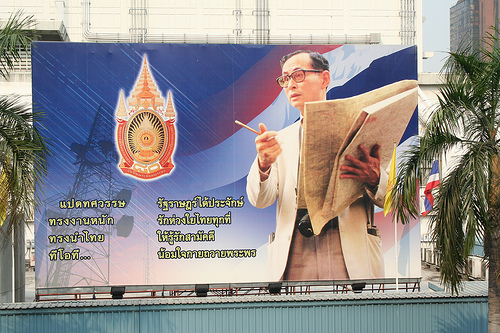We can see the manifestation of that fact today in the headlines in Jakarta, the bloggers of Singapore, by-elections in Malaysia, the mysteries of Naypyidaw, and perhaps most starkly in the sois of Bangkok.
The Cold War produced tough, practical men who understood and exercised hard power, manipulated the bipolar dynamic dominated by the Russians and the Americans, crushed opponents, and suborned bureaucracies and institutions in order to build. Southeast Asia was a nearly perfect example of this phenomenon.
Most ASEAN countries are relatively young, having ripped their independence from the hands of European, American, and Japanese colonial powers after World War II. The independence struggle produced lion-like men who had the will and ambition to lead. Some of them like Sukarno in Indonesia and Tun Razak in Malaysia defined themselves as emancipators and were ousted or elected to leave, while others went on to consolidate sovereignty and create countries, hacking new realities out of literal and figurative jungles. Their accomplishments are astonishing, and history will record the indisputable fact that they created some of the world’s most dynamic countries.
By definition, the Cold War heightened, certainly for Southeast Asian countries given the proximity of the Vietnam War, the demand for larger-than-life leaders – men who could make decisions, centralise power, and suffer no opposition. Examples populate Southeast Asia’s recent history – no business leader need have gone beyond Jakarta to cut a deal in Indonesia under Soeharto; no opposition political party has been able to grow roots in Singapore; Anwar Ibrahim famously tested Mahathir’s leadership and paid the price; though overthrown by People’s Power, Marcos’ cynically ensured the capability of a clique of leading families to retain their feudal hold on business and politics in the Philippines; Ne Win built the world’s only real time machine by taking his country completely off the grid through the ‘Burmese Path to Socialism’; and the King of Thailand, supported as always by the Privy Council and the military, adjudicated beneficently as dozens of prime ministers came and went, virtually part-time administrators of the kingdom.
However, as their successors would soon discover, the region’s ‘great’ men left relatively weak institutions and governance behind. Ironically, as they achieved their goals for rapid economic development, the monolithic leaders created a middle class and well-educated elites who traveled the world and added information technology infrastructure to the roads, rails, and runways. Empowered citizens began to seek broader participation in government, expanded ownership of sovereign wealth, and rights equivalent to those of others they saw on TV, in the movies, or on the Internet.
Today, we are witnessing the clash of the results of those Southeast Asia’s leaders’ rule. On the one hand, there are dynamic countries leading the world’s economic growth with talented and forward-looking populations. On the other hand, there are weak institutions, paternalistic political cultures, and governance systems unprepared to manage broad input and competing ideas. Change is inevitable, and today’s leaders cannot run countries like their predecessors once did.
Thailand is but one example, but perhaps the most acute and timely to examine. It is undergoing a historic evolution in which the traditional institutions that guaranteed independence (Thailand was never formally colonised), sovereignty, security, and economic opportunity are being challenged by a new dynamic, ignited perhaps by exiled former prime minister Thaksin Shinawatra but certainly not wholly controlled by him.
Thailand, like its neighbors, is a country going through political growing pains. The fact that this chapter has been a bloody one is tragic, but not surprising. Real equities are at stake, and the stridency of opposing parties tells of the life-or-death sense of urgency felt by those seeking to preserve traditional structures and those striving for a new model.
When you read the headlines from Bangkok, think about Southeast Asia and the historic and political context of the confrontation playing out in the streets. Policy-makers would do well to refresh their understanding of the region’s history and think about how the attention-grabbing headlines in Bangkok relate to more subtle frictions around the region.
Southeast Asia is maturing politically. The path its countries take will be neither linear nor bloodless, but it is one that partner countries need to understand in order to develop enduring strategies and support the long-term interests of ASEAN’s people.
Ernest Bower is Senior Adviser and Director of the Southeast Asia Program at the Center for Strategic and International Studies (CSIS), Washington.


Sukarno would be gratified to learn that, just forty years after his death, his long-term adversary, Tunku Abdul Rahman, had disappeared from history, pushed aside by his dour successor, Tun Razak. It was in fact, the Tunku who “ripped” Malaya’s independence from the British colonialists in 1957. Thereafter, however, he channelled the violence in his nature largely towards hitting golf balls. And, to ensure the colonialists had no hard feelings over the ripping, he became the architect of what Sukarno saw as the neocolonialist Malaysia project to help the British encircle Indonesia. As for the “lion-like” Razak, he was neither ousted nor did he elect to leave but died prematurely at 53.